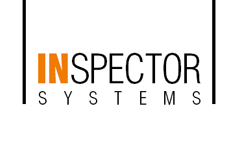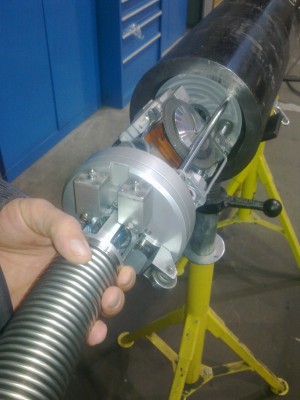On the basis of the requirement of FMC Technologies and RPT Production to grind the safety-relevant vertical pipelines of an oil platform from the inside, the clients began to intensively sound out the global market. Ultimately they were persuaded by the INSPECTOR SYSTEMS grinding robot technology.
FMC Technologies is an American oil service company based in Houston, Texas. It is also an award-winning one as in 2010 FMC was nominated as the "World's Most Admired Oil and Gas Equipment, Service Company".
RPT Production is a Norwegian company which was established in 1999 and has since then grown into a leading provider in the Norwegian off-shore market. Among other things the company supplies systems for under-sea oil production (subsea systems), measuring technology and drilling equipment. A specialist field of RPT Productions is the welding of “exotic” pipe materials. FMC Technologies operates 27 facilities in 16 countries and has 11,500 employees. The grinding robot for FMC Technologies was sold to the workshop in Dunfermline, Scotland.
At the start of 2011 the contract to develop two identical grinding robots was awarded. The operating range of the two grinding robots was for diameters of just 120 mm to 140 mm. In total approximately 250 welds had to be ground.
In the contract the technical challenge for INSPECTOR SYSTEMS consisted in developing a grinding robot for the unusually small diameter range. For this, a grinding motor that had already been developed during a project for the new construction of a nuclear power station in Olkiluoto was fallen back on. The principle on which both identical grinding robots are based is in keeping with INSPECTOR SYSTEMS‘ renowned grinding robot technology.
The grinding robots consist of an electronics housing and a grinding unit. In this case the INSPECTOR SYSTEMS drive elements capable of climbing and traversing bends could be dispensed with as all the welds were machined during prefabrication. The grinding unit is made up of the components rotating unit, centring unit, radial unit, grinding motor, grinding camera and axial adjuster.
The rotating unit is positioned between the centring unit and allows the grinding motor to be reversibly rotated about 380°. The centring unit is for centrically fixing the grinding unit after reaching the working position in the pipe. The motor is adapted directly on the grinding motor and axial adjuster. With it the grinding disk is mechanically brought into the operating position and the material removal controlled. The axial adjuster is integrated into the rotating unit and has a motor-driven travel of ± 25mm. This enables the grinding motor to be moved axially into the correct position.
To monitor the grinding process a grinding camera was used. A control unit comprising a power cabinet, control cabinat, operating panel and monitor/DVD unit was used to controlling all the grinding functions.
Successful acceptance of the two grinding robots took place in mid-2011 in Rödermark. Personnel from the company FMC Technologies in Scotland as well as personnel from the company RPT Production in Norway were then trained as qualified operators.
Since the end of 2011 prefabrication of the vertical pipes has been fully under way in Scotland and Norway with the INSPECTOR SYSTEMS grinding robots doing their work.


